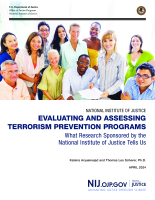Hate Crime Research Portfolio
NIJ’s Hate Crime Research Portfolio aims to inform efforts to prevent hate crimes, improve their identification and response, and enhance outcomes for victims.
Hate crimes are criminal offenses motivated in part or entirely by prejudice or bias against a defined group of people with specific characteristics. [1] Hate crimes — as widely codified in state and federal laws — are recognized as a...



